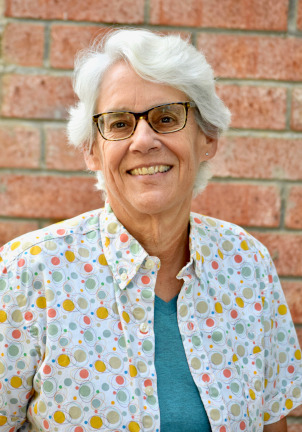She’s done it again! Santa Cruz author Leslie Karst is about to launch the fifth book in her Sally Solari series—The Fragrance of Death. Once again, the restaurateur-turned-sleuth gets into a pickle as she tracks down the perp of a murder at the annual Artichoke Cook-Off.
Problemo: Solari has lost her sense of taste and smell. Once again, jumping into the bouillabaisse with her can-do protagonist, Karst, who will be reading from and discussing the new book at Bookshop Santa Cruz on Thursday, Aug. 4, spoke to me about how this latest—could it be the last? —Solari murder caper came into existence. How will she cope while still tracking down the murderer?
You’ve written Sally Solari mysteries dealing with all of the five senses. This book focuses on the sense of smell. Which one of the senses gave you the most challenge in terms of plotting?
LESLIE KARST: I’d have to say that Murder from Scratch, which focuses on the sense of touch, presented the most challenges. In that fourth book in the series, Sally’s younger, blind cousin Evie comes to live with her after her mother is found dead in their home, and through Evie’s heightened sense of touch, she’s able to discover clues that Sally might otherwise have missed. But writing a blind character was not easy. I wanted her to be a real, fully fleshed-out character, which meant—being sighted myself—that I had to do serious and detailed research. For instance, I visited our local Vista Center for the Blind on several occasions, and they graciously introduced me to various clients who were happy to discuss with me their experiences being blind. And I was also lucky enough to spend a weekend with a blind friend and have her show me all the cool adaptive technology and apps that now exist—and she even cooked a delicious dinner for me, too!
You write what are called ‘cozy’ mysteries. How do they differ from, say, the mysteries written by Louise Penny?
The term “cozy” was coined in the 1980s to describe what was then becoming a hugely popular subgenre of murder mysteries—those in which there is no graphic violence or explicit sex and where the sleuth is someone not involved in law enforcement but is nevertheless sucked into investigating the crime. Cozies generally take place in a small town, which makes it more believable for the protagonist to know or have access to all the suspects and tend to feature “everyday” occupations such as crafting, bookstores, dog groomers, wedding planners, or—as in my series—restaurateurs. I like to think of my Sally Solari books as “snarky cozies” since they have an edgier tone than many others in the subgenre and often touch on serious subjects such as sustainable food practices, drug abuse, immigration, and the macho environment prevalent in so many commercial kitchens.
Why do you think readers enjoy this particular sub-genre?
In these stressful times, when virtually every news story makes you want to run to the medicine cabinet for a dose of Prilosec, it’s wonderful to know that if you crack open the pages of a cozy mystery, you’re in for an enjoyable puzzle with a satisfying conclusion. Yes, they are about murder—not a particularly “happy” subject—but more importantly, cozies are stories of how the average person has the power to restore justice and normalcy to a community which has been thrown into upheaval and chaos by the crime. In a way, it’s all about providing to the reader a sense of order in a world that seems to have spun out of control.
How does writing in the first person add energy to the books? Does it create speed bumps in the overall plotting process?
A first-person vantage point definitely adds a certain energy to stories, as the reader learns things in real-time, along with the protagonist. If Sally is creeping down a hallway, following the sound of a strange voice in her living room, so are we, the readers, and we experience her fear and excitement right along with her. A first-person narrative thus brings a sense of intimacy to the story and allows for empathy and identification with the main character.
First-person can be tricky to write, however, because you can only be in your protagonist’s head. Since I can’t step outside of Sally’s mind, I have to find other ways to make the secondary characters come alive solely through her observations and thoughts. But the most difficult aspect of writing a first-person mystery novel comes from the rule of fair play: since the readers discover relevant clues along with Sally, I can’t have her withhold crucial facts from them. In other words, the reader should be able to solve the mystery at the same time as she. Thus, playing fair while maintaining the tension until that final “ah-ha!” moment is, for me, the key to a compelling first-person story.
Is this the end of the Sally Solari mystery series?
It is not! In fact, I just recently finished the draft of number six in the series, to be published in August of 2023. In this book (working title, A Sense for Murder), the dining room manager of a restaurant cum culinary-themed bookstore is found murdered on the night of a benefit dinner, and the primary clue is the simultaneous theft of a boxed set of signed first editions of Julia Child’s Mastering the Art of French Cooking. As you can guess, the sense involved in this book is the “sixth sense.”
Leslie Karst Reading and Signing happens Thursday, Aug. 4 at 7pm. Bookshop Santa Cruz, 1520 Pacific Ave., Santa Cruz. bookshopsantacruz.com.














